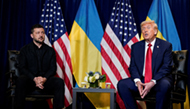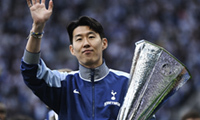President Kim Assumes Role of Mediator in `Pyongyang Equation’
``The Bush administration, the Republican government that has come to power after eight years of Democratic rule, might employ the hard-line approach used by the last Republican administration and scare Pyongyang back into its old xenophobic cocoon,’’ a senior government official said, adding that ``President Kim’s latest activities can be viewed in this context.’’
Telltale signs abound.
In the Jan. 22 Cabinet meeting, President Kim stressed that ROK-U.S. ties ``can’t be severed at any cost.’’
However, he voiced a veiled concern about a shift in U.S. policy toward the North under the new administration, saying, ``Despite outrageous speculation following the inauguration of the Bush administration, I don’t expect any major change in the ROK-U.S. policy toward Pyongyang.’’
The President gave emphasis to his remarks by adding, ``The two countries need an exchange of opinions in terms of how to implement it. ‘’
During a 20-minute telephone conversation with President Bush on Jan. 25, President Kim again stressed that the close coordination with the previous Bill Clinton administration and the three-way cooperation among Seoul, Tokyo and Washington have played a key role in ``major’’ progress in South- North rapprochement.
The President, on other occasions, pointed out the obviously close ROK- U.S. ties and, according to government officials and experts, there is adequate reason for that.
``The last time that the Republicans were in power was eight years ago,’’ the government official said. ``But the intervening eight years have seen more change than the previous 20 years. The President needs to inform the Bush administration of the changes to help it readjust itself to a new set of parameters.’’
The fear that the Republican government might turn back the South-North clock preceded the inauguration of President George W. Bush.
Experts pointed out that the Bush administration might take a hard-line stance toward Pyongyang, if the traditional Republican approach serves as any indication. For instance, new Secretary of State Colin Powell, in his Senate confirmation hearing, dubbed Kim Jong-il as a ``dictator,’’ harbingering that North Korea policy will be drawn up and implemented on a more reciprocal basis.
Some government officials said that Powell showed the old Republican mentality that doesn’t conform to the current status of the South-North relationship.
``I didn’t think that any senior cabinet member would say such a thing,’’ one official said. ``If it represented the new U.S. government’s mentality in general, it could scare Pyongyang back into its cave.’’
In this way, President Kim will likely see himself more in the role of mediator, on one hand enticing the North to open up and, on the other hand, bringing its close allies _ U.S. and Japan _ closer to his engagement policy, a government official said.
He said that despite Pyongyang’s hint of more openness, indicated by Kim Jong-il’s visit to China, the North can’t achieve the market size and flexibility that the communist giant has taken advantage of to become what it is today.
``The U.S. holds one of the two keys,’’ he said. ``If the U.S. lifts restrictions on Pyongyang, the North would be able to borrow from the world’s lending organizations and receive reparations from Japan for its colonial occupation in order to fund its reconstruction.’’
He said that it was a matter of course for Pyongyang to show it is worth the benefit of a shift in the U.S. stance, becoming more forthcoming to address the U.S. concern on its weapons of mass destruction.
``President Kim has to juggle these multiple priorities,’’ he said.
As for the outlook, Dong Yong-seung, senior researcher for North Korea affairs at the Samsung Economic Research Institute, ruled out the possibility that Seoul and Washington would fail to come up with a joint approach in dealing with the Stalinist country.
Dong, a close watcher of Pyongyang for more than 10 years, said that the new U.S. administration fully respects President Kim for his role in greater detente on the Korean peninsula, while President Kim stressed the need for a continued U.S. presence, even in a unified Korea.
He pointed out that a potential factor in the North Korea equation might lie in the Pyongyang-Beijing relationship.
``The U.S. seems to be pushing the North as a villain to get its national missile defense (NMD) off the ground, but the real motive lies in the rising power of China,’’ he said. ``We have to wait and see how the two allies will act, and the outcome will have a bearing on the U.S. policy toward Pyongyang.’’
?
스마터리빙
more [ 건강]
[ 건강]이제 혈관 건강도 챙기자!
[현대해운]우리 눈에 보이지 않기 때문에 혈관 건강을 챙기는 것은 결코 쉽지 않은데요. 여러분은 혈관 건강을 유지하기 위해 어떤 노력을 하시나요?
 [ 건강]
[ 건강]내 몸이 건강해지는 과일궁합
 [ 라이프]
[ 라이프]벌레야 물럿거라! 천연 해충제 만들기
 [ 건강]
[ 건강]혈압 낮추는데 좋은 식품
[현대해운]혈관 건강은 주로 노화가 진행되면서 지켜야 할 문제라고 인식되어 왔습니다. 최근 생활 패턴과 식생활의 변화로 혈관의 노화 진행이 빨라지고
사람·사람들
more많이 본 기사
- 특검, 尹에 징역 10년 구형… “법치주의·사법질서 파괴”
- 韓정부, 노란봉투법 해석 지침 공개… 하청 임금·근로조건 좌우하면 ‘진짜 사장’
- 한파에 고드름이 주렁주렁… 서울 이번 겨울 첫 한파주의보
- ‘정보 유출자 셀프 조사’ 경찰에 늦게 알린 쿠팡… 증거인멸 의혹
- ‘서해 공무원 피격 은폐’ 혐의 서훈·박지원 등 1심 모두 무죄
- “아동 수출국 오명 벗는다” 70년 만에 해외입양 중단
- 황하나, 마약 도피 중 캄보디아서 출산.. “아이 양육” 호소에도 구속
- 트럼프 “소말릴란드 아는 사람 있나?”…이스라엘 승인에 ‘NO’
- “영원한 생명 주실 승리의 하느님 오신 날”
- 특검, 김건희 ‘금품 수수’ 무더기 기소… 뇌물 여부는 경찰 몫으로
- 쏟아지는 갑질·특혜 의혹… 버티는 김병기, 속 끓는 정청래
- “올해 최고 주목받은 테크 거물은 머스크 아닌 래리 엘리슨”
- 김정은, 핵잠 이어 미사일 공장도 시찰
- “새해 1호 법안은 2차특검” 정청래, 강경 기조 그대로
- 與 ‘통일교·신천지 특검법’ 발의… 野 “뜬금없다”
- ‘NCT 탈퇴’ 태일, 성폭행 혐의로 결국 감옥行..징역 3년 6개월 확정
- 찰스 3세, 내년 방미 추진…트럼프에 英왕실 ‘매력 공세’될까
- 이혁재가 또.. “빌려간 3억원 안 갚아” 사기 혐의로 피소
- ‘김건희에 로저비비에 선물’ 김기현 부인 특검 재출석…곧 기소
- 소싯적 ‘치기어린’ 주소 “굿바이”…지메일 주소변경기능 도입
- 러, 트럼프-젤렌스키 종전회담 직전 키이우 대규모 공습
- ‘마약 혐의’ 남양유업 3세 황하나 구속… “증거인멸 우려”
- 국제은값 폭등에 개인투자자들 銀투자 대거 유입
- 효연, 소녀시대 수입 서열 공개 “1위 나 아냐..윤아·태연이 더 벌어”
- LA 등 서부에 사흘째 폭우…동부엔 폭설 예보
- 8시즌 뛰고 ML 역대 17위 “오타니 GOAT 될 것”, ML 역대 50인 선정
- 곽도원, 음주운전 3년 만 복귀각..스토리제이컴퍼니 측 “미팅 했지만 계약 단계 아냐”
- “출생시민권은 사기”⋯ 이민 2세대 공격 초점 맞춘 트럼프
- 16세로 성장한 버클리 문학, 성대한 송년 파티
- VA·MD 7명 생굴 먹고 식중독…22개주 60여명 감염
- 미국, 美방산기업 제재한 中에 “대만 무기판매 보복 강력반대”
- ‘역대 최연소’ 백악관 대변인 레빗, 둘째 임신 공개
- “온 세상에 희망·평화의 빛 스며들길”
- 작년 운용자산 5조5천억달러…갑부들의 ‘패밀리오피스’ 월가 새 강자로
- ‘손흥민 감격의 첫 우승’ 올해 축구계 기적 톱8 선정 ‘선수로는 유일’
- “연말은 스트레스·새해 결심은 없다”
- [이지 사이언스] “온난화 막으려면 세계인구 44% 식단 바꿔야…문제는 소고기”
- 젤렌스키 “28일 트럼프와 종전안 논의…영토·원전 외 90% 완성”
- ICE 버지니아 구금시설 ‘포화’…수감자 역대최고
- 위성락, 유엔 사무총장에게 방북 요청한듯…대통령실 “확인 어렵다”
- 통일교 ‘키맨’ 윤영호·송광석 재조사… ‘공소시효 난제’ 풀까
- 트럼프 관세에…고급 와인 시장도 ‘휘청’
- ‘손흥민 vs 메시’ 2026 MLS 개막전서 세기의 맞대결 예고
- KCCEB, 새이름 ‘마루’로 재탄생
- 린다 한 “내년 1월17일 별도 한인회연합회 만들겠다”
- 한미장학재단에 3만달러 영구장학금 기탁
- 대만이슈 돌출로 美中 ‘삐걱’…내년 4월 트럼프 방중前 기싸움?
- 루비오 국무장관, 트럼프가 민 온두라스 당선인과 통화… “명확한 승리”
- “엔비디아, AI칩 스타트업 인수 아닌 기술 계약으로 규제 회피”
- 쿠팡, 자체 조사결과 발표후 첫거래일 급등…뉴욕증시서 6%↑
1/5지식톡

-
 미 육군 사관학교 West Poin…
0
미 육군 사관학교 West Poin…
0https://youtu.be/SxD8cEhNV6Q연락처:wpkapca@gmail.comJohn Choi: 714-716-6414West Point 합격증을 받으셨나요?미 육군사관학교 West Point 학부모 모…
-
 ☝️해외에서도 가능한 한국어 선생님…
0
☝️해외에서도 가능한 한국어 선생님…
0이 영상 하나면 충분합니다!♥️상담신청문의♥️☝️ 문의 폭주로 '선착순 상담'만 진행합니다.☎️ : 02-6213-9094✨카카오톡ID : @GOODEDU77 (@골뱅이 꼭 붙여주셔야합니다…
-
 테슬라 자동차 시트커버 장착
0
테슬라 자동차 시트커버 장착
0테슬라 시트커버, 사놓고 아직 못 씌우셨죠?장착이 생각보다 쉽지 않습니다.20년 경력 전문가에게 맡기세요 — 깔끔하고 딱 맞게 장착해드립니다!장착비용:앞좌석: $40뒷좌석: $60앞·뒷좌석 …
-
 식당용 부탄가스
0
식당용 부탄가스
0식당용 부탄가스 홀세일 합니다 로스앤젤레스 다운타운 픽업 가능 안녕 하세요?강아지 & 고양이 모든 애완동물 / 반려동물 식품 & 모든 애완동물/반려동물 관련 제품들 전문적으로 홀세일/취급하는 회사 입니다 100% …
-
 ACSL 국제 컴퓨터 과학 대회, …
0
ACSL 국제 컴퓨터 과학 대회, …
0웹사이트 : www.eduspot.co.kr 카카오톡 상담하기 : https://pf.kakao.com/_BEQWxb블로그 : https://blog.naver.com/eduspotmain안녕하세요, 에듀스팟입니다…
케이타운 1번가
오피니언

새해 더 중요해지는 노동법 준수

연말연시, 안전하고 차분하게
 캐슬린 파커 워싱턴포스트 칼럼니스트
캐슬린 파커 워싱턴포스트 칼럼니스트 [캐슬린 파커 칼럼] 지미 라이의 마지막 희망
 유경재 나성북부교회 담임목사
유경재 나성북부교회 담임목사 [한국춘추] 미국의 힘
 전병두 서북미수필가협회 회원
전병두 서북미수필가협회 회원 [금요단상] 비자 발급
 박일근 / 한국일보 수석논설위원
박일근 / 한국일보 수석논설위원 [지평선] 스님의 주례사
 신상철 / 고려대 고고미술사학과 교수
신상철 / 고려대 고고미술사학과 교수 [미술 다시보기] 신의 모습을 닮고자 한 예술가
 스티브 강 전 한인민주당협회 회장
스티브 강 전 한인민주당협회 회장 [스티브 강 ‘인사이드 미국’] 2026 중간선거: 트럼프 지지율 하락이 말해주는 것
 김홍일 케이유니콘인베스트먼트 대표
김홍일 케이유니콘인베스트먼트 대표 [기고] 안정의 기준은 어떻게 제도가 되었나
1/3지사별 뉴스

물류거점창고에 불체자 8만명 수용 추진
도널드 트럼프 행정부가 이민자 구금·추방을 효율화하기 위해 전국 물류거점 창고에 8만명 규모의 수용시설 확보를 추진한다고 24일 워싱턴 포스트…
‘학자금 상환’ 안하면 임금압류

“온 세상에 희망·평화의 빛 스며들길”
가자지구와 우크라이나에서의 전쟁, 고립과 불평등으로 세상이 어지러운 가운데 워싱턴 지역 각급 한인교회와 성당들이 성탄절을 맞아 일제히 예배와 …
“연말은 스트레스·새해 결심은 없다”

‘손흥민 vs 메시’ 2026 MLS 개막전서 세기의 맞대결 예고
LA 풋볼클럽(LAFC)가 2026시즌 MLS 정규리그 일정을 공식 발표하며 한인 축구 팬들의 시선을 한몸에 받고 있다. LAFC는 오는 20…
[새해부터 이렇게 달라진다] 최저임금 또 오르고… 유급 병가는 더 확대

오늘 하루 이 창 열지 않음 닫기 





















































.png)


댓글 안에 당신의 성숙함도 담아 주세요.
'오늘의 한마디'는 기사에 대하여 자신의 생각을 말하고 남의 생각을 들으며 서로 다양한 의견을 나누는 공간입니다. 그러나 간혹 불건전한 내용을 올리시는 분들이 계셔서 건전한 인터넷문화 정착을 위해 아래와 같은 운영원칙을 적용합니다.
자체 모니터링을 통해 아래에 해당하는 내용이 포함된 댓글이 발견되면 예고없이 삭제 조치를 하겠습니다.
불건전한 댓글을 올리거나, 이름에 비속어 및 상대방의 불쾌감을 주는 단어를 사용, 유명인 또는 특정 일반인을 사칭하는 경우 이용에 대한 차단 제재를 받을 수 있습니다. 차단될 경우, 일주일간 댓글을 달수 없게 됩니다.
명예훼손, 개인정보 유출, 욕설 등 법률에 위반되는 댓글은 관계 법령에 의거 민형사상 처벌을 받을 수 있으니 이용에 주의를 부탁드립니다.
Close
x